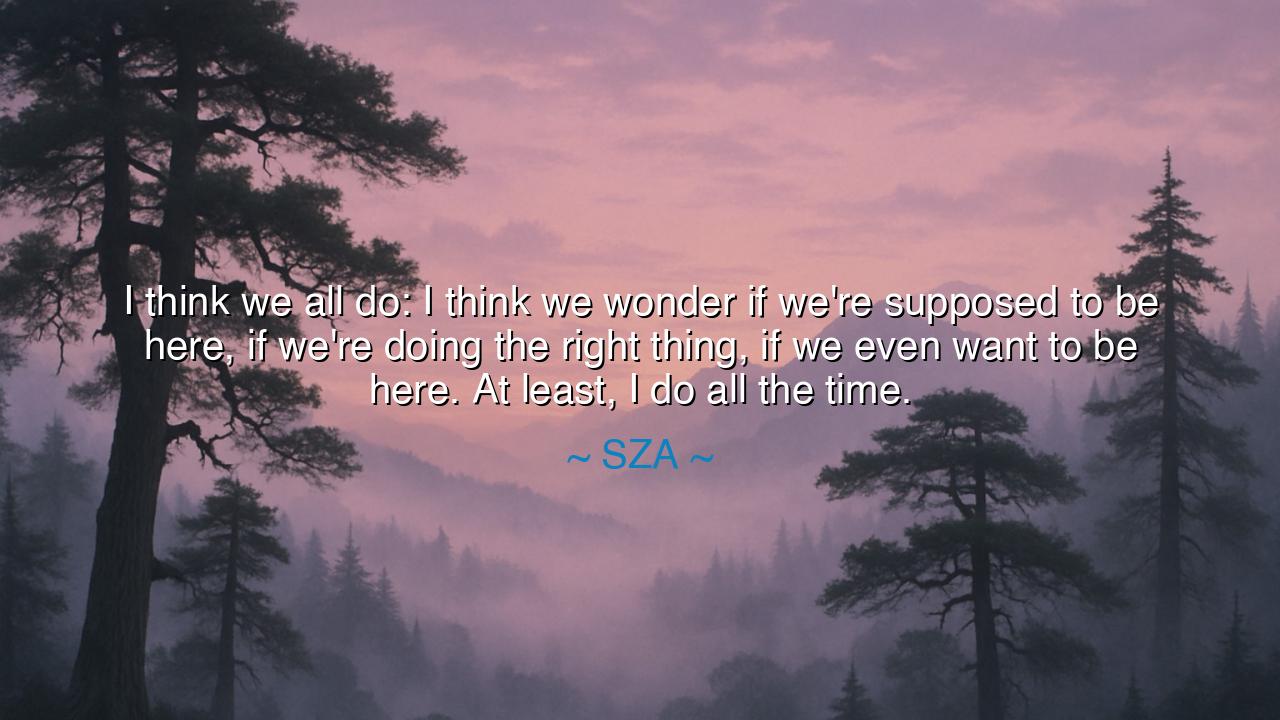
I think we all do: I think we wonder if we're supposed to be
I think we all do: I think we wonder if we're supposed to be here, if we're doing the right thing, if we even want to be here. At least, I do all the time.






Hear, O children of restless hearts, the words of SZA, who spoke with honesty of the soul’s secret struggle: “I think we all do: I think we wonder if we’re supposed to be here, if we’re doing the right thing, if we even want to be here. At least, I do all the time.” These are not the polished words of certainty, but the raw cry of humanity that asks again and again, Why am I here? What is my purpose? Do I belong? Her words carry the weight of an ancient question, older than kings and prophets, a question whispered by every heart in the silence of night.
The wondering she speaks of is the very essence of human consciousness. Unlike beasts who live by instinct, men and women carry the burden of self-awareness. To be alive is to wrestle with doubt, to question whether our path is the right one, whether our place in the world is true. SZA gives voice to this universal unease, reminding us that even in moments of success or recognition, the soul may still tremble and ask, Am I truly where I ought to be?
History echoes with this struggle. Think of Hamlet, who stood upon the stage of eternity and asked, “To be, or not to be?” His soliloquy was not madness alone but the eternal cry of the human spirit questioning existence. Or recall St. Augustine, who confessed, “Our hearts are restless until they rest in Thee.” In both the play and the confession, we see the same longing, the same questioning that SZA names. To doubt is not weakness—it is the mark of a soul that seeks truth.
Consider also the life of Vincent van Gogh, who painted with fire yet lived in torment, forever doubting whether his work had worth, whether his existence mattered. The world now reveres him, but in his own time he carried the very same thoughts SZA describes: Am I supposed to be here? Do I belong? His struggle did not diminish his genius—it was part of it, for in questioning, he reached deeper into the mystery of life.
The meaning of SZA’s words is thus not despair, but solidarity. By confessing her doubts, she reminds us that we are not alone. The uncertainty that shadows our steps is not unique but universal. It binds us together, for every human heart has wondered whether it walks the right path. In speaking it aloud, she transforms isolation into connection, turning private doubt into shared humanity.
The lesson for us is this: do not flee from these questions. To wonder is to be awake. To ask if you are in the right place is the sign of a spirit that desires meaning, not emptiness. Yet do not allow the wondering to paralyze you. Let it instead be fuel for growth, a compass pointing you toward reflection, change, and authenticity. The doubts are not curses; they are torches meant to guide you deeper into the truth of your life.
Practically, this means embracing self-reflection without self-condemnation. Take time to ask yourself what truly matters, and allow those questions to shape your choices. If you are uncertain, seek clarity not through endless fear but through small acts of courage. Surround yourself with those who remind you of your worth, and extend the same reminder to others. When the voice of doubt comes, meet it not with shame, but with curiosity: What is this doubt trying to teach me?
So, O listeners, remember SZA’s wisdom: we all wonder if we are supposed to be here. That wonder is not a flaw, but a doorway. Step through it, and you may find not despair, but purpose. Do not be afraid of the questions, for they are the companions of every thinking soul. Instead, let them shape you into one who seeks meaning, lives authentically, and walks forward with courage—even when the way is uncertain. For to wonder is to live, and to keep walking in spite of wonder is to be truly alive.
––






AAdministratorAdministrator
Welcome, honored guests. Please leave a comment, we will respond soon